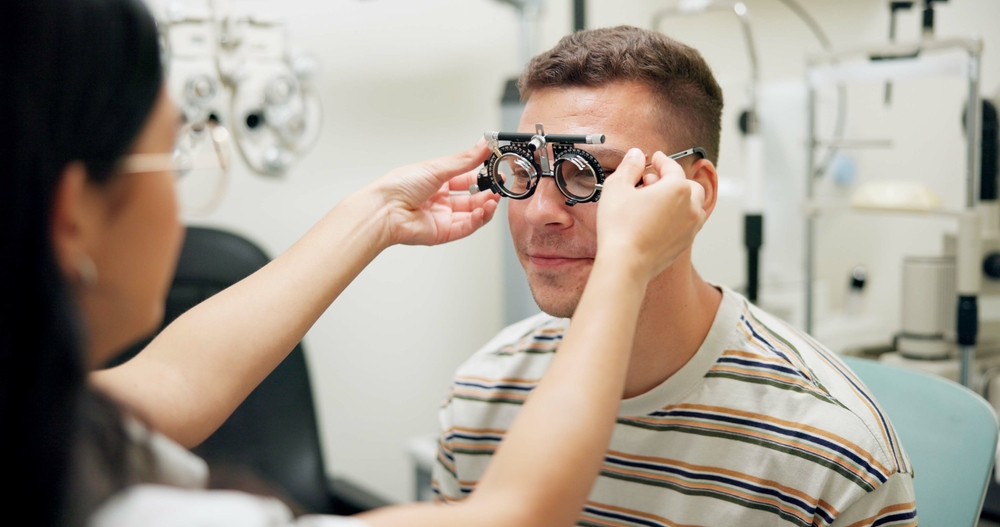
Dry eye is a common condition that occurs when your eyes do not produce enough tears or when the tears evaporate too quickly. This can lead to discomfort, irritation, and a range of other symptoms that can impact your daily life. Dry eye is a chronic condition that requires ongoing management and monitoring to keep it under control.
Common Causes and Symptoms of Dry Eye
Dry eye is caused by a variety of factors, including aging, certain medical conditions, meibomian gland dysfunction, blepharitis, environmental factors, and even certain medications. Symptoms of dry eye can include:
Feeling of dryness
Grittiness or irritation in the eyes
Redness or inflammation of the eyes
Blurred vision or sensitivity to light
Difficulty wearing contact lenses
Watery eyes
Dry eye is a chronic condition that requires ongoing care and attention to keep it under control. Regular check-ups with your eye doctor can help you track the progress of your treatment and make any necessary adjustments to ensure that your eyes remain healthy and comfortable.
How Often to See Your Optometrist for Dry Eye
The frequency of visits to your optometrist for dry eye depends on several key factors. If you have mild dry eye, an annual routine check-up may be sufficient to monitor your condition. However, for more severe cases, you may need to see your eye doctor every 3-6 months to ensure your symptoms are being effectively managed and your treatment plan is adjusted as necessary.
The effectiveness of your current treatment also plays a role in how often you should visit your optometrist. If your symptoms are well controlled, once or twice a year might be enough. On the other hand, if your symptoms persist or worsen, more frequent visits may be required to fine-tune your treatment.
Underlying medical conditions, such as Sjögren's syndrome, rheumatoid arthritis, or thyroid disorders, can complicate dry eye management. If you have one of these conditions, closer monitoring by your eye doctor is crucial to ensure your dry eye is properly treated.
Ultimately, the frequency of your visits should align with your personal preferences and comfort level. Some people feel more at ease with regular check-ups, while others may prefer fewer visits. It’s important to collaborate with your optometrist to determine a schedule that works best for your individual needs.
The Benefits of Regular Eye Examinations for Overall Eye Health
In addition to managing your dry eye, regular eye examinations are essential for maintaining overall eye health. During these visits, your optometrist can:
Detect and monitor other eye conditions: Regular check-ups can help identify and monitor other eye conditions, such as glaucoma, cataracts, or macular degeneration, which may require additional treatment or management.
Evaluate your vision: Your eye doctor can assess your visual acuity and make any necessary adjustments to your prescription for glasses or contact lenses.
Provide personalized recommendations: Based on your individual needs and eye health, your eye doctor can provide you with tailored recommendations for maintaining optimal eye health, such as dietary changes, lifestyle modifications, or specialized treatments.
By prioritizing regular eye examinations, you can take a proactive approach to managing your dry eye and ensuring the long-term health and well-being of your eyes.
Taking Steps to Maintain Healthy Eyes and Manage Dry Eye
Dry eye is a chronic condition that requires ongoing care and attention, but with the right approach, you can effectively manage your symptoms and maintain healthy eyes. By understanding the importance of regular eye doctor visits, and considering the various factors that influence the frequency of those visits, you can take control of your eye health and enjoy a more comfortable, fulfilling daily life.
If you're struggling with dry eye and need professional guidance, contact Eye Care Center of North Jersey. Our experienced optometrists are dedicated to providing personalized care and tailored treatment plans to help you achieve optimal eye health. Visit our office in Scotch Plains, New Jersey, or call (908) 322-8040 to schedule your appointment and take the first step towards managing your dry eye effectively.


